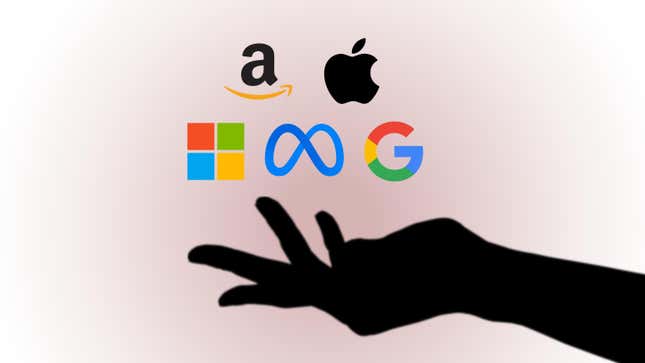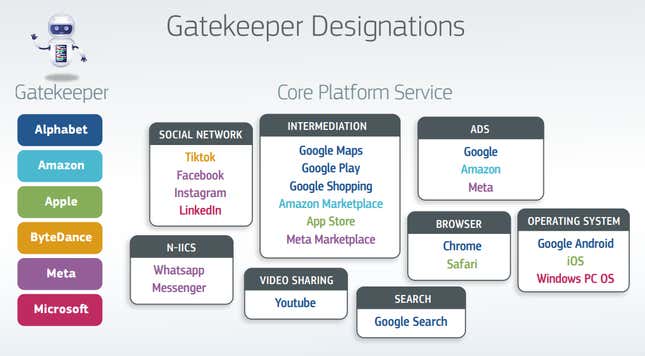
The European Union is now coming out and saying what they, and everybody else, already knows. The six big tech companies, including Alphabet (Google), Amazon, Apple, ByteDance, Meta, and Microsoft, are the six big “gatekeepers” of our modern online ecosystem. These companies now have to make sure that all of the 22 designated platforms under their respective portfolios adhere to regulations that prevent them from monopolizing their digital domains.
Early on Wednesday, the EU Commission shared a list of the 22 “Core Platform Services” that need to comply with the Digital Markets Act. The DMA restricts companies from mandating their own services as default on their devices and enforces interoperability between apps such as messaging applications. The regulations passed through the European Parliament last year and have technically been in effect since May, though without the crucial “gatekeeper” designations. Tech companies needed to have more than 45 million monthly active users with a market cap of $82 billion to qualify for the designations.

As for what platforms are cited by the EU as Core Platforms, they include apps like TikTok, Facebook, Instagram, and YouTube; app stores like Google Play, Apple App Store, and Meta Marketplace; browsers that include Chrome and Safari; and the major operating systems including Android, iOS, and Windows. Google came out worst of all the Gatekeepers, with most of its major services, including its bread and butter Google Search, making the list.
What this all means is complicated, but suffice it to say none of these big tech companies are able to restrict other competing apps from their platforms. For example, Apple can’t restrict users from installing Google Play on their iPhones. On apps like TikTok, the China-based ByteDance can’t restrict Meta from advertising Instagram on the platform.
EU’s industry chief Thierry Breton wrote on Twitter “It’s D-Day for the DMA!” In the release, Breton said the designations give “more choice to consumers” and creates “new opportunities for smaller innovative tech companies.”
Apple does not seem happy about the designations. In a statement to Reuters, the Cupertino company said “Our focus will be on how we mitigate these impacts and continue to deliver the very best products and services to our European customers.” The company also told the outlet it was “very concerned about the privacy and data security risks” imposed by the new regulations. The company has shared concerns about users sideloading unauthorized apps, but Breton’s comments imply that sideloading is an intended effect of the DMA.
However, these provisions do not include any email service, whether that’s Gmail or Outlook. The list also does not include Samsung Internet Browser, or even Samsung as one of the major gatekeepers. The EU wrote that while all those apps meet the thresholds to “qualify as gatekeeper,” their owner companies “provided sufficiently justified arguments showing that these services do not qualify as gateways for the respective core platform services.”
In addition, there are no cloud services listed under those core platforms, so it seems like Google Drive and Microsoft’s OneDrive are off the hook. The Commission also mentioned its investigating whether Microsoft’s Bing search, Edge browser, and Microsoft Advertising—as well as Apple iMessage—actually qualify as “gateways.” The European government is also trying to gauge whether Apple’s iPadOS is a gatekeeper under the DMA. Those investigations could take a little less than half a year to 12 months, respectively.
On Tuesday, the Financial Times reported Apple is moving to make the legal case that iMessage isn’t a gatekeeper since it’s designed for “personal consumer communications.” Similarly, Microsoft is trying to fight off Bing’s designation as a core platform. The company is reportedly concerned that allowing competing search services like Google through its platform would only help increase its competitor’s monopolistic market share.